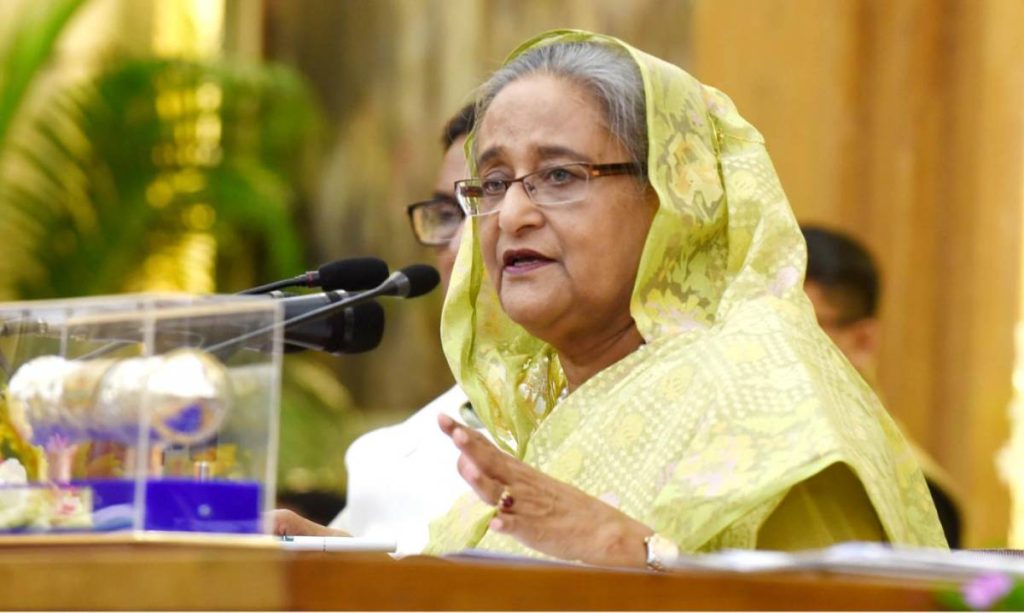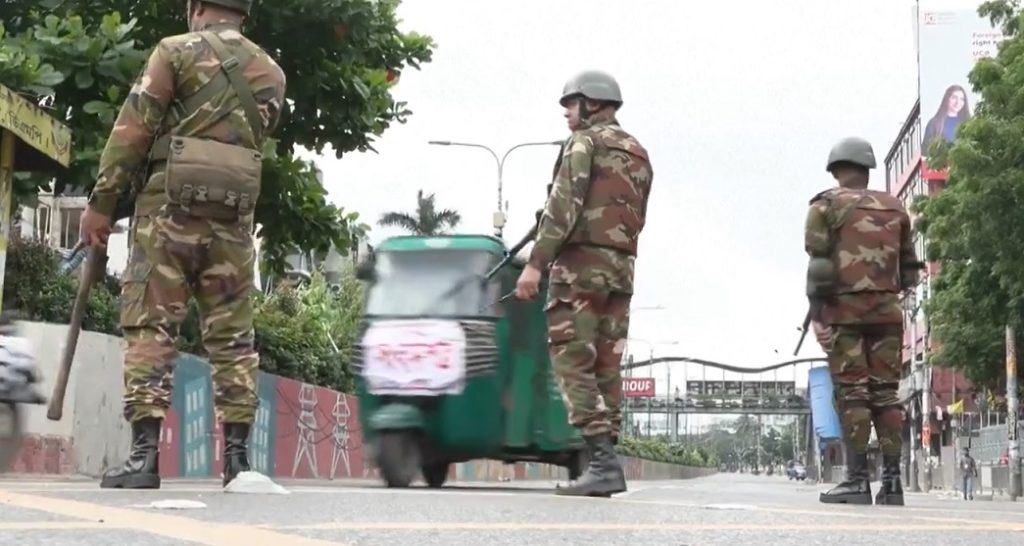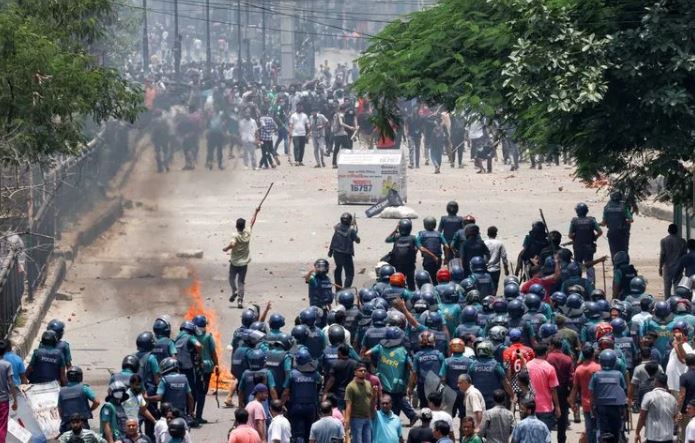The nature of the conspiracy is beginning to reveal a dark connivance aimed at disgracing the Bangladesh ‘s Awami League (AL) government of Prime Minister Sheikh Hasina, who has to her credit back-to-back election victories, writes Hafiz Aamir Hassan
There are ample indications that the so-called quota reform movement allegedly led by students over July 18-19 causing large scale unrest in Bangladesh is being fomented and egged on by a Bangladesh Nationalist Party (BNP)-Jamaat-e-Islami (JeI) intrigue. The nature of the conspiracy is beginning to reveal a dark connivance aimed at disgracing the Awami League (AL) government of Prime Minister Sheikh Hasina, who has to her credit back-to-back election victories. Dhaka Police have hinted that the Chattra Shibir, the student wing of the outlawed Jamaat-e-Islami (JeI) backed by Pakistan’s ISI, has played a major role instigating violence and transforming student protests into a political movement in Bangladesh that has impacted the routine of millions.
Every few years, the opposition BNP, which has lost the support and sympathy of the people, tries to undermine the validity of the government by staging and orchestrating violent protests over some cause or the other. It has become adept at organising nationwide strikes and blockades often bringing Bangladesh to a grinding halt. This latest student protests were openly backed by the backed by the Bangladesh Nationalist Party, with Razakars who aided the Pakistani military’s genocide of locals in erstwhile East Pakistan prior to the creation of Bangladesh among its ranks. The motive of Pakistan’s army and ISI is to destabilise the Shiekh Hasina government and bring the opposition BNP back in power.

The BNP itself is a master of engaging in disinformation campaigns. A diverse combination of actors including BNP hired trolls, bots, its leading politicians, highly partisan media outlets, the mainstream media, and its allied foreign governments are all playing overlapping roles in producing and amplifying disinformation with regards to the quota reform movement in the media.
In Bangladesh, the “fake news” tool has been used more effectively by the BNP and its allied Islamist parties to stoke tensions and disseminate fundamentalist propaganda. This time the BNP supporters attacked the High Court decision of reviving the old quota system wherein 30% were reserved for the descendants of freedom fighters. The BNP and its allies have systematically tried to undermine the Bangladeshi people’s struggle for accountability regarding the Genocide perpetrated against its people by the Pakistani military authorities. This genocide, organised in tandem with Islamic fanatic organisations from both West and East Pakistan, was meant to destroy the Bengali identity by murdering elites, destroying religious diversity, and raping women.

After the Detective Branch (DB) of Dhaka Metropolitan Police (DMP) raided BNP’s Nayapaltan central office on July 23, more than 100 cocktails, 5-6 bottles of petrol, a large number of sticks and 60 local and foreign weapons were recovered from the BNP office.Seven members of BNP’s associate bodies, including Chhatra Dal, were arrested in this connection. Among them is former president of Chhatra Dal Kazi Rownakul Islam (Srabon).
The BNP head office is where the conspiracies and violent politics centering the quota reform movement was being instigated and abetted by the leaders of Jatiyatabadi Chhatra Dal (JCD) and its associate bodies.
Awami League General Secretary and Road Transport and Bridges Minister Obaidul Quader has said that the BNP-Jamaat is using the movement as a tool to loot political benefits.
The Bangladesh Supreme Court was forced to scale back the quota system, offering a major victory to the BNP led protesters. The 30% quota for families of the fighters of the Liberation war has now been brought down to 5%.

In the past steady negative propaganda by BNP leaders in exile resulted in the Biden Administration distinguishing Pakistan as a democracy and Bangladesh as a non-democracy, coupling this stamp with a set of sanctions in 2021. During every election sensing its poor chances of winning on the merits of its performance, the BNP leaders are engaged in creating a narrative about the supposedly faulty conditions of the elections. Take for instance how the BNP and its Islamist allies like the Jamaat used the plight of the fire victims in the Kutupalong Rohingya refugee camp on 25 March 2023, to criticise the Awami League and portray a picture of Rohingya persecution in Bangladesh, in order to create discord.
The large majority obtained by the Awami League since 2009 has allowed Sheikh Hasina to lead the country with a steadiness never experienced before in its history. In 2014 a rattled BNP unleashed the worst election violence in Bangladesh’s history. In every election cycle the BNP threatens to trigger a wave of protests similar to those of 2014. The political instability brings to the fore the risk of adverse fallout on the economic situation; the current student unrest will also prove to be a setback for the AL government which has been consistently working towards the economic upliftment of the country, deftly navigating the nation from the worst impacts of the Covid-19 pandemic. Because of Islamist ideology and historical connections the BNP has always focused on better relations with Pakistan and by extension, the military establishment in Islamabad has always sought a BNP led government in Dhaka.

The Chinese Ambassador to Bangladesh,Yao Wen has described the protests as Bangladesh’s internal matter, adding that the people & government of Bangladesh were fully capable of maintaining peace in the country. However, prior to the protests that erupted on July 18, specifically on July 17, the Chinese Ambassador held a meeting with senior BNP leaders, including Air Vice Marshal (Retd.) Altaf Hossain Chowdhury, BNP Vice Chairman & former Home Minister and Shama Obaid, Organising Secretary, at the Chinese Embassy. Interestingly, Pakistan High Commissioner to Bangladesh, Syed Ahmed Maroof also visited the Chinese Embassy while the BNP leaders were meeting the Chinese Ambassador.
What cannot be ignored is the role of China, during Bangladesh’s war of independence against Pakistan in 1971. China, being Pakistan’s key ally, opposed the emergence of Bangladesh as an independent state. Although China claims to have a cooperative relationship with the Awami League (AL) which has been historically closer to India, it prefers that the BNP return to power. The role of the ISI to undermine the Hasina government which has cracked down against radicals is nothing new, but now, what started as a student protest against quotas in jobs has been transformed into a political movement through infiltration of cadres of opposition parties into the protesting groups.
Meanwhile the Hasina government has responded to the quota movement with patience and tolerance.
ALSO READ: UN Chief Concerned Over Bangladesh Using UN Vehicles in Riots

